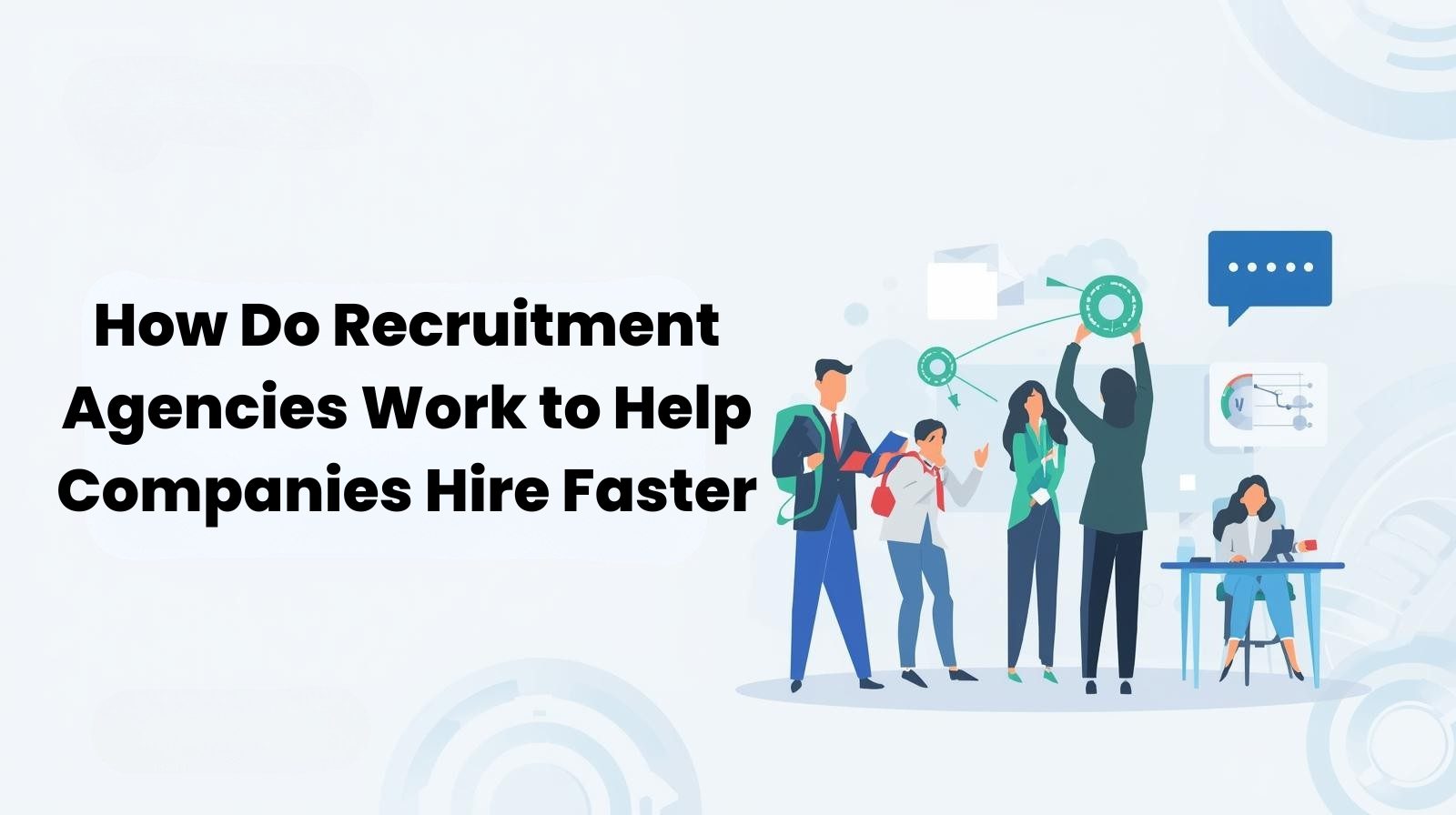Posted on November 18th, 2025

Speed is everything. Companies that fail to secure top talent quickly risk losing them to faster-moving competitors. This is why many employers now ask a crucial question: how do recruitment agencies work to accelerate the hiring process? Understanding how recruitment agencies operate provides insight into why they have become essential partners for businesses looking to hire efficiently and strategically.
From sourcing candidates to managing interviews, recruitment agencies streamline every step of the hiring lifecycle. These agencies bring expertise, technology, and industry knowledge that allow them to fill positions in days instead of months. Whether you're a startup scaling fast or an enterprise with ongoing hiring needs, recruitment agencies offer the structure, systems, and talent networks required to support rapid business growth.
Before understanding how recruitment agencies work, it’s important to look at why companies often experience hiring delays:
Many HR teams are overwhelmed, juggling multiple tasks beyond recruitment-training, payroll, compliance, employee relations, and more. This limits the time they can dedicate to active candidate sourcing and outreach.
Most in-house teams rely on traditional job ads, internal referrals, or limited databases. When roles require niche skills or urgent filling, this network isn’t enough.
In sectors like tech, healthcare, logistics, and finance, candidates receive multiple offers. Slow hiring processes lead to lost opportunities.
Sorting through hundreds of resumes, scheduling interviews, and conducting assessments consumes time. Without a specialized system, delays are inevitable.
Companies often lack real-time data on salary benchmarks, candidate expectations, and industry trends-leading to misaligned job requirements and delayed decisions.
This is where recruitment agencies step in with a proven, faster model.
Recruitment agencies use a structured, strategic, and tech-enabled process to support companies in hiring faster. Here’s how the model works from start to finish.
The first step in how recruitment agencies work is a detailed consultation with the employer. Agencies gather information such as:
This discovery stage ensures the agency creates a customized hiring plan that aligns with business priorities.
Recruitment agencies don’t just post jobs-they strategically position them.
This includes:
Instead of waiting passively for applicants, agencies actively promote opportunities where the right talent is most likely to engage.
This is one of the biggest advantages of using recruitment agencies.
Agencies leverage:
Because they constantly build relationships with job seekers, recruitment agencies have instant access to thousands of pre-qualified candidates-allowing companies to hire much faster.
Many companies lose weeks simply reviewing resumes. To answer the question “how do recruitment agencies work to save time?”-this is a critical stage.
Agencies conduct:
Only the top candidates who meet all requirements move forward. This filters out unqualified applicants and ensures companies only see the best talent.
Recruitment agencies act as project managers throughout interview coordination.
Their responsibilities include:
This reduces administrative delays and keeps the hiring process moving smoothly.
To ensure a strong match, agencies coach candidates on:
Well-prepared candidates perform better, helping employers make faster and more confident hiring decisions.
One of the biggest hurdles companies face is losing candidates during the offer stage. Recruitment agencies minimize this by:
This keeps the process smooth and professional-leading to quicker offer acceptance.
Some agencies also support onboarding by:
A seamless onboarding process increases retention and reduces early turnover.
Companies often wonder not just how recruitment agencies work, but how they make hiring faster.
Here are the top ways they boost speed:
Agencies maintain databases of candidates who are actively looking or open to opportunities.
Whether it’s healthcare, tech, finance, engineering, or logistics, agencies know where and how to find niche talent.
They use AI-driven applicant tracking systems, automated screening tools, and sourcing technology.
Recruiters dedicate 100% of their time to hiring-something internal teams rarely have bandwidth for.
Agencies have structured evaluation frameworks that eliminate guesswork.
Coordination, communication, and documentation are all handled by the agency.
Their mediation helps keep candidates committed through every stage.
Market insights help company decisions happen faster and more accurately.
Understanding how recruitment agencies work also means knowing the types available:
Paid only when a candidate is hired.
Used for executive or highly specialized roles.
Provide contractors and temporary workers.
Agencies manage the company’s entire hiring process.
Specialists in fields like healthcare, tech, IT, engineering, or finance.
Each model supports faster hiring in different ways depending on the company’s needs.
Beyond hiring speed, agencies offer:
This combination makes recruitment agencies indispensable for modern hiring.
Agencies operate as a bridge:
They provide talent, manage workflows, and support decision-making.
They offer guidance, match them with opportunities, and assist with career transitions.
This dual support ensures better matches and faster hires for everyone involved.
With talent shortages increasing in sectors like healthcare, cybersecurity, engineering, and data analytics, the competition for skilled talent is fiercer than ever.
Internal teams alone cannot keep up with hiring pressures.
Recruitment agencies bring:
Companies that partner with agencies simply hire faster and smarter.
If you're wondering how recruitment agencies work and whether they are worth the investment-the answer is simple: Recruitment agencies streamline, accelerate, and elevate the entire hiring process. They provide better candidates in less time, reduce internal workload, and help companies stay competitive in high-demand talent markets.
In a world where hiring speed shapes business success, recruitment agencies have become essential strategic partners for growth.
Looking to hire faster without compromising on quality?
W3Global delivers industry-leading recruitment solutions with unmatched speed, precision, and expertise.
Whether you need specialized talent, large-scale hiring support, or end-to-end recruitment management, our team is ready to help you build high-performing teams that drive real results.
Hire smarter and faster with W3Global. Connect with us today.